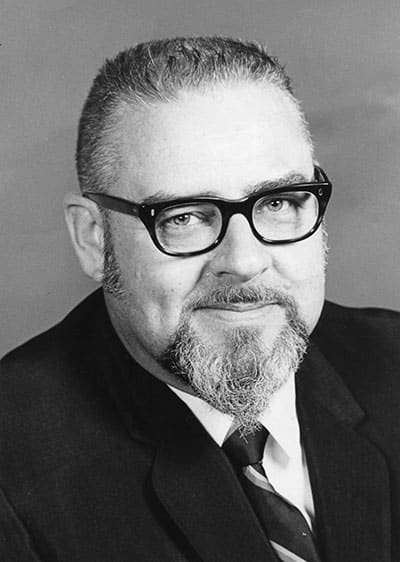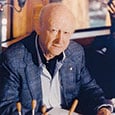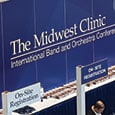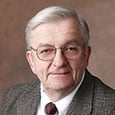Originally published: December 1991
Francis McBeth was a great friend of the magazine and shared his thoughts in many articles written for us. He was talented, opinionated, and hilarious in equal amounts. In addition to his prolific composing, he taught at Ouachita Baptist University for four decades. This excerpt is from his 1991 article on Band Music and the Paper-Plate Mentality.
I think we would be shocked if we knew students’ reactions to much of the music that is played. They are really quite bored with it, and I don’t blame them. Too many directors choose music that neither they nor the students really like. It’s chosen because it fits a minimum instrumentation or shows off a few skilled players at contest.
When my son was in junior high school his band played a concert of canned rock, which the kids loved; marches, which they thought were all right; and folk song suites which bored them but which parents thought they should appreciate. It was that night I decided to write Canto with its clapping and wood clackers. If composers do not write exciting concert music for junior high students, we will lose them.
It is important to show young players that concert music can be more exciting than pop by our choice of literature. There are wonderful junior high works not played anymore, such as Clifton Williams’ Arioso, which is easy, wonderful, and 20th century.
I think many composers take the wrong approach to junior high music. The direction should be writing more musically challenging music but tailoring it to the ease of fingerings and the characteristics of each instrument. In other words, simplicity of mechanics as opposed to simple music. This is the difference also between Tchaikovsky and Prokofiev. Prokofiev wrote at the piano and then scored the music, which is very hard to play. When Tchaikovsky wrote, he wrote for each instrument and knew what that instrument could do.
Some years ago, I conducted the Prokofiev Third Piano Concerto and the Tchaikovsky Fifth Symphony on adjacent concerts with the Arkansas Symphony. The beginning of the Prokofiev had simple rhythms – quarters, eighths, halves – but was difficult to play. With the Tchaikovsky, the first reading sounded like we had worked on it for a week because when Tchaikovsky wrote for the clarinet he wrote for the clarinet, and when he wrote for the trombone, he wrote for the trombone. Young players don’t need simple music. They need more complicated music that entails simple mechanics.
When Clifton Williams won the first Ostwald competition in 1956 for Fanfare and Allegro, band music was getting exciting. Williams promoted band music with a missionary zeal. At his annual Southwestern Symposium at the University of Texas, he would alternate bringing in Vincent Persichetti and Paul Creston because they were the major conductors with true band interest in those days. John Barnes Chance and I were students at the University of Texas during that time, and we wrote mainly for orchestra. Williams convinced us of the necessity of writing for band.

One noon at an Austin restaurant, Williams said, “The orchestra is the Cadillac. I know that, but they don’t want you. They don’t want anything past Debussy and truly dislike 20th Century music. The winds are where you want to go because they want new music. They are ripe for it because they don’t have a repertoire. They’ve about folk-song suited themselves out of business.
Then came Barney’s Incantation and Dance, more Persichetti, then Martin Mailman’s Liturgical Music and the Geometrics series, a few things of LoPresti, then Claude Smith’s Incidental Suite. You notice I left myself out of this period because of Southern modesty. Hanson, Schuman, Mennin, and others were seeing the possibilities of wind music. The biggest spurt in the literature came from Nelhybel – a real European into the fray. His Symphonic Movement and Requiem are two of the very best works ever written for band. I use the Symphonic Movement each year to teach my students about the art of organic growth. What an exciting time for us, and it lasted well into the 1970s.





